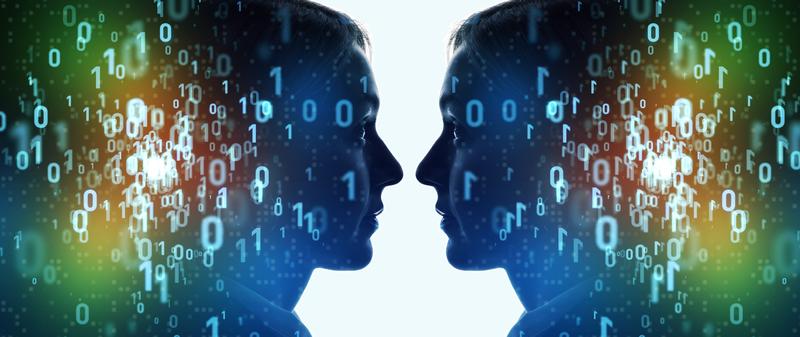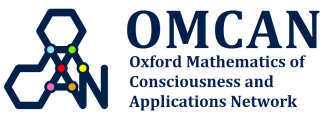Mathematics of Consciousness Workshop
Mathematics of Consciousness Workshop

Mathematical Institute, Oxford University, UK
Friday 7th July 2023
A one-day workshop exploring selected mathematical challenges in consciousness research
Dear friends and colleagues,
We are delighted to offer this free one-day workshop aimed at both the Mathematical Consciousness Science (MCS) researcher, and those from the wider mathematical and physical sciences research community curious to gain an understanding of some mathematical challenges in consciousness research.
In this workshop, we acknowledge the hard problem of consciousness, which is the challenge of explaining, in scientific terms, how cognitive brain activity is related to phenomenal consciousness experiences; that there is something it is like to be a human. In particular, there are persistent, consistent, experiential phenomena occurring within human brains that will be amenable to mathematical methods. MCS is an emerging field of the applied mathematical and physical sciences. It is a two-way street that will catalyse new mathematical concepts as progress is made.
This workshop will explore a subset of ten challenges, listed below. These challenges fall within various mathematical sub-fields, where new concepts are required, ranging across topology, category theory, dynamical systems, network science, information theory, AI, non-binary computing, data science, and reverse engineering. This exploratory programme is very far from being exhaustive of all mathematical approaches to consciousness. The workshop will be interactive and involve discussion sessions. We hope you will explore these challenges with us. The workshop is free but registration is required via the form below.
The workshop organisers-OMCAN.
Provisional list of challenges
This list may be updated
1. The Topology of Human Sensory Perception
Phenomenal consciousness is full of relational content. This challenge is to understand the topology of the perceptual spaces formed by these relationships by using computational algebraic topology.
2. The Asymptotics of Networks and Complex Systems
Gaining deeper insights into brain activity is an important part of the scientific study of consciousness. This challenge involves developing a network theory equivalent of asymptotic methods to help analyse systems of order 10B dynamical nodes.
3. Multi-Level Systems: the Synthesis of Multi-Scale Data Resources
The scientific study of consciousness and cognition relies heavily on data, such as fMRI and other forms of scanning. This challenge is to develop methods to analyse multi-level data in a consistent way.
4. High Resolution Simulation and Reverse Engineering
Undertaking whole brain simulations provides access to what happens within such systems at a level of detail that is unobtainable from living brains. This challenge is to move closer to this goal notwithstanding the current limitations and restricted availability of super computers.
5. Sub-Neuronal Structures: Stochastic and Nonlinear PDEs
Some ideas about consciousness refer to sub-neuronal structures in order to explain consciousness. Examples range from so-called field-theories of consciousness, which take consciousness to be dependent on electromagnetic and/or neuro-chemical fields both within and between neurons. Others tie consciousness to the quantum domain. A recent theorem shows that any theory which posits consciousness to be dynamically relevant has dynamics that, to first order in time, resemble a quantum-dynamical collapse model. This challenge is to investigate such models but, more widely, also involves the study of existence and regularity properties of integro-differential equations that model long range interactions between neurons, possibly including delays. This includes studies of the inner and extra-cellular distribution (concentration) profiles of neuro-chemicals or neuro-transmitters, for example, and how these relate to the prevalence of cell-spiking and threshold dynamics.
6. Alternative Foundations and Models of Computation
There is much interest in neuro-inspired forms of computation, particularly within companies that will produce next generation processors. Progress in understanding how consciousness attaches to the physical word, and what it does in doing so, might offer new perspectives for computation. This challenge is to investigate how ideas from mathematical consciousness science can create new approached to computation by taking consciousness into account at a foundational level.
7. Beyond Integrated Information Theory (IIT)
A prominent theory of consciousness, that has been proposed in the neuroscience of consciousness community, is Integrated Information Theory (IIT). Unlike Shannon information however, integrated information is not defined in terms of a single short formula and is based on largely empirical and philosophical considerations. This challenge is to go beyond the neuroscientific concepts to produce a genuinely mathematical understanding of integrated information that will have applications in various mathematical fields as well as improving IIT.
8. Falsifiable Predictions and Independent Verification
In order to be scientific, various theories of consciousness need to go well beyond being descriptions of what might be. Theories need to make some falsifiable predictions. This challenge is to introduce a mathematical foundation and formulation of these theories that allows for rigorous prediction, and/or, at the very least, the development of a framework for undertaking Bayesian confirmation where evidence is available.
9. Next Generation AI
This challenge is to investigate what can be learned from consciousness, or from the concepts and mechanisms that appear to be present within consciousness, that might extend or improve existing approaches to AI, and to deep learning in particular.
10. Neuromorphic Non-Binary Chips
Our final challenge is of practical relevance: To develop the mathematics to test and design new types of information processors away from the constraints of silicon chips. Aims include a new type of information processor specifically designed to bring down the cost of implementing AI and AGI models and brain simulations.
Practical information
Date and time: Friday 7th July 2023; The workshop will start with coffee on arrival at 10:30.
Room: Lecture room L4 (also breakout room L6).
Location: Mathematical Institute, University of Oxford, Andrew Wiles Building, Radcliffe Observatory Quarter (550), Woodstock Road, Oxford OX2 6GG.
Hospitality: A buffet lunch will be provided. Tea and coffee breaks will be provided both in the morning and afternoon.
Fee: This is a free workshop, but registration is required.
Registration deadline: Thursday 22nd June 2023.
Registration
Registration is now closed.
*The OMCAN privacy notice is available here.




